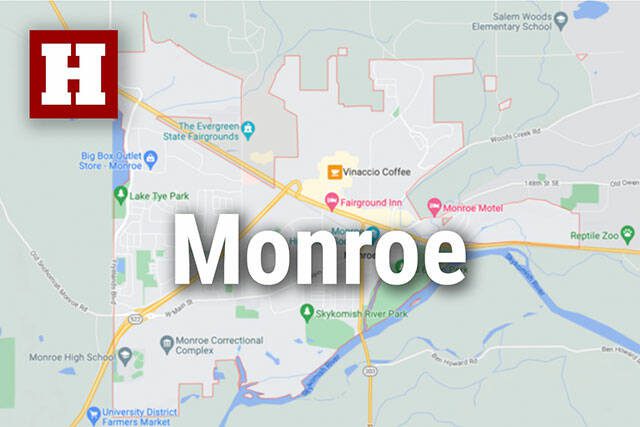MONROE — State appeals court judges on Wednesday overturned an $185 million jury verdict awarded to three former teachers at the Sky Valley Education Center in Monroe who sued Monsanto alleging exposure to toxic chemicals at the school left them with permanent health defects.
After a seven-week trial in 2021, a King County jury found Monsanto liable for the contamination at the school and awarded damages to the three teachers — Kerry Erickson, Michelle Leahy and Joyce Marquardt. They were the first of hundreds of teachers, students and their families to go to trial over their exposure to polychlorinated biphenyls, or PCBs, that leaked from light ballasts in the school.
This case is also the first to reach the appeals court after trial, Judge Janet Chung noted in her opinion.
For compensatory damages, the jury awarded $15 million each to Erickson, $18 million to Leahy and $17 million to Marquardt. On top of that, the jury also agreed to award each with $45 million in punitive damages. The plaintiffs’ attorneys asked the jury to award at least $10 million each in compensatory damages and three times that for punitive damages for each.
The attorneys successfully argued Monsanto should be subject to law in Missouri, where Monsanto is based. Washington does not allow punitive damages in this type of case, but Missouri does, so the attorneys argued Missouri law applied even though the case was tried in Washington.
On appeal, Bayer Pharmaceuticals — which acquired Monsanto in 2018 — took numerous issues with the proceedings in King County Superior Court. An esoteric difference between Washington and Missouri law is what drew the attention of the state appeals court.
The plaintiffs brought their case under the 1981 Washington Product Liability Act. That law contains what is called a statute of repose, meaning plaintiffs must suffer their harm from the product within its “useful safe life.” State law elaborates on what it means by “useful safe life” by stating: “If the harm was caused more than twelve years after the time of delivery, a presumption arises that the harm was caused after the useful safe life had expired.”
Meanwhile, Missouri state law contains no “statute of repose” — meaning plaintiffs don’t need to suffer their injuries during the “useful safe life” of the product. Given this, the Monroe teachers asked a judge to apply Missouri law on the issue of the statute of repose in their PCB case. The judge agreed to do so.
But in a complex 78-page opinion Wednesday, the appeals court found the King County judge erred by allowing that.
The ruling potentially sends the case back to King County for another trial. But the plaintiffs could first take their case to the state Supreme Court.
Wednesday’s ruling could have implications for many other similar cases over exposure at the Sky Valley Education Center. In a statement, Monsanto called the ruling “very significant.”
“The Company will consider its legal options regarding the application of this ruling to other SVEC verdicts that are in conflict with it, as well as how this ruling could affect any future trials,” the company said.
Henry Jones, one of the plaintiffs’ attorneys, said: “We always knew this case was headed for the state Supreme Court.”
“We believe we will ultimately prevail there, but even if we don’t, we will still win these cases at the trial level, following the rules laid out by the Court of Appeals,” Jones continued. “This is a delay, but not a setback.”
The appeals court ruling Wednesday comes just a week after a King County judge halved a staggering $784 million in punitive damages awarded to seven women who claimed they were poisoned by PCBS at the Monroe school. Monsanto called that jury verdict “arbitrary and excessive.”
Last week, the judge in that case reduced the punitive damages to $365 million, a five-to-one ratio to the $73 million in compensatory damages. In doing so, he followed a recent law passed in Missouri that set a maximum five-to-one ratio for damages.
Banned by the federal Environmental Protection Agency in 1979, PCBs were used in fluorescent light ballasts. Monsanto produced the man-made chemicals, also known as Aroclors.
When Sky Valley was built in 1950, some 95% of the light ballasts had PCBs, according to court documents. For years, teachers and students noticed brown oily liquid leaking from the light fixtures. Staff would put trash cans underneath and tell pupils to stay away.
Lawsuits across the country have claimed Monsanto covered up the risks of chemical exposure, including cancer and other illnesses.
It took until 1977 for the company to stop producing PCBs, under intense regulatory pressure.
Teachers and students have claimed a range of ailments stemming from the PCBs, from nausea and breathing problems to cancer and brain damage.
Jake Goldstein-Street: 425-339-3439; jake.goldstein-street@heraldnet.com; Twitter: @GoldsteinStreet.
Talk to us
> Give us your news tips.
> Send us a letter to the editor.
> More Herald contact information.

























